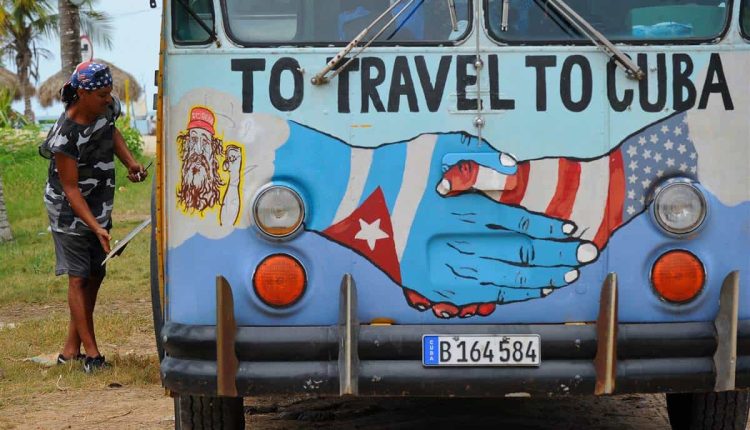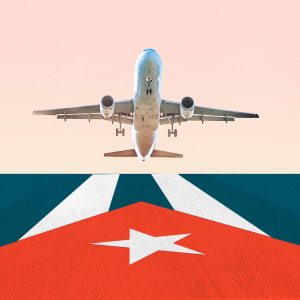
How Marazul was born. A personal history
Marazul Travel has been one of the principal sponsors of Progreso Semanal / Weekly since its creation in 2001. It was an initiative of Francisco González Aruca, president of Marazul, who advanced it until his death in 2013. Its banner appears stamped on our web page with the invitation: Get to Know Cuba with Marazul.
But, what where the origins of Marazul?
 The idea of opening a travel agency for Cubans living in the US was hatched in a room on the 20th floor of the Habana Riviera Hotel in December 1978, when a group of directors of the Antonio Maceo Brigade and Areíto magazine, participants in the “Dialogue of the Cuban Government with representative figures of the Cuban community abroad”, decided to take advantage of the recent decision of the Cuban government to authorize the visit of its emigres to Cuba, prohibited by both governments for almost twenty years.
The idea of opening a travel agency for Cubans living in the US was hatched in a room on the 20th floor of the Habana Riviera Hotel in December 1978, when a group of directors of the Antonio Maceo Brigade and Areíto magazine, participants in the “Dialogue of the Cuban Government with representative figures of the Cuban community abroad”, decided to take advantage of the recent decision of the Cuban government to authorize the visit of its emigres to Cuba, prohibited by both governments for almost twenty years.
To implement these accords, the Cuban government created a travel wholesaler, Havanatur S.A., and various emigres undertook the business of creating an infrastructure of local travel agencies in different countries and cities with the greatest concentration of Cubans, to sell tickets and facilitate the transportation of travelers to Cuba.
The first agency created by this group and also the first to take Cuban emigres to Cuba was Viajes Varadero in Puerto Rico, founded by Carlos Muñiz Varela, Raúl Álzaga and Ricardo Fraga. Despite the constant attacks by terrorist groups of Cuban origin and the Puerto Rican right wing, including the murder of Carlos only months after the agency was inaugurated, a crime that has never been duly investigated and judged by Puerto Rican and US authorities, their offices remain open today to provide services for Cubans living in that country.
We determined to create another agency in the United States under the name of CubaTravel and open three offices: Washington DC, Miami and Nueva York. The president of the company was Francisco Aruca, founder of Areito, economist by profession, living in Washington DC. In Miami, Vicente Dopico together with Margarita Lejarza, also founders of Areíto, opened that office. Lastly, I opened the agency in New York, with the collaboration of Vivian Otero.
When I went to register the name CubaTravel, it turned out that it had already been registered by another company, which offered to sell us the brand for $60,000. We did not even have a tenth of that sum! After consulting with my partners, I decided to change the name to Marazul, recalling the hotel by the same name in Santa María del Mar, now called Tropicoco.
Practically without any initial capital, with money collected from among all of us, we rented a small office in a building on Broadway and 34th Street, across from Macy’s. Quickly the word spread among the Cuban emigres in New York and New Jersey, and those interested in travelling to Cuba began to flock the office. Since there was no room in the reception area, the clients lined up in the hallway outside waiting to be assisted.
We filled out their forms and collected payment — I think it was $600 in cash! At the end of the day we accumulated thousands of dollars that whenever possible we deposit at the nearby branch of Chemical Bank, where we had our account. If we were too late, we carried the bills with us in a paper bag on the subway up to Washington Heights, where Vivian lived, undaunted by the danger that we faced and not even thinking of spending money on a taxi. How young we were!
The daily deposit of so much cash raised the suspicion of our bank officer, an African-American that one day showed up at the office to verify the operation, but when he saw the line of Cubans waiting in the hallway, he realized that it was a “cultural phenomenon” and not money laundering.
We kept this up until the company’s financial situation improved allowing us to rent a bigger office, also at a choice location: Broadway and 57th Street, near Central Park. We managed to get a good workplace at a reasonable rent, because we were willing to accept the 13th floor that others considered bad luck. We hired more persons to attend to the clientele, including a receptionist versed in Santeria, that secured our protection from various evils. But she could do nothing against the terrorist threats that characterized this controversial business, which consisted in allowing Cuban emigres the possibility of visiting their families and their homeland.
It fared worse for the Miami office. There was even a bomb placed at the home of ‘El Rojo’ Vicente, while his young daughter slept, but they were never able to interrupt our service. Aruca eventually moved to Miami and, besides directing the company, he inaugurated a radio program called Radio Progreso Alternativa, that shook the political environment dominated by the extreme right-wing “Cuban” radio stations – WQBA “La Cubanísima”, Radio Mambí and others– with a progressive discourse, daring and challenging; so much so that, despite its high audience rating, they managed to shut down his access to available radio stations and drove him off the air.
Digital journalism was just beginning and, taking advantage of that opportunity, Aruca, Álvaro Fernández and Manuel Alberto Ramy, our first correspondent in Cuba, created Progreso Semanal / Weekly. Álvaro, as chief editor, has maintained the weekly magazine come hell or high water during twenty years, and now a group of us are bolstering it and relaunching it in the social media because, desperate times require energetic solutions.
And Marazul, now in its third generation, continues to accompany and support us.

